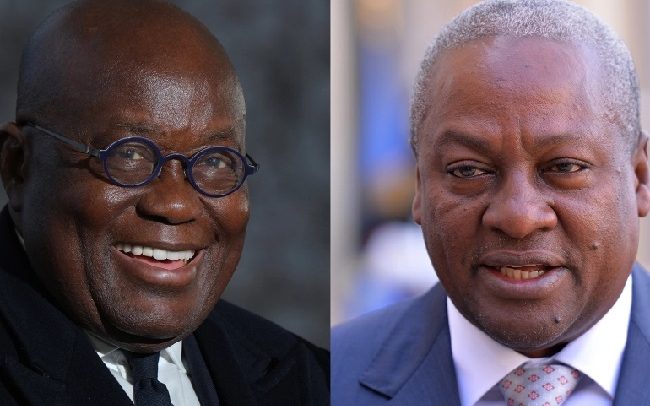President Nana Akufo-Addo and Former President John Mahama
President Akufo-Addo has given a veiled response to ex-President John Dramani Mahama’s assertion that democracy has not benefited the country when the former President recently described the whole democratic arrangement as a ruse.
Mr. Mahama speaking at a forum organized by NDC Professionals and a group calling itself Center for Ethical Governance and Administration (CEGA) stated that “the much-heralded democratic dividend is fast turning into a mirage far beyond the reach of the people for whom it was intended.”
Mr. Mahama said Ghanaians had begun to question the nation’s democratic effort, insisting that the democratic arrangement is “only a ruse to grant access to the resources of a country to a few privileged elites to do as they please with it and satisfy their creature comforts to the detriment of the masses who should be the ultimate beneficiaries.”
But President Akufo-Addo has dismissed the assertion, intimating that democracy has not only been beneficial to Ghana, but the entire African continent.
Addressing the 2021 annual conference of the Ghana Bar Association in Bolgatanga in the Upper East Region on Monday, the President said “We know, however, that the price of freedom is eternal vigilance, and we shall be here in Ghana.”
He added that “we shall not let our guard down, and allow the clammy embrace of the people by anti-democrats, who are disdainful and incapable of effective popular mobilisation through accepted channels, but who want shortcuts to power without the express support of the people.”
According to the President, data and history have proven beyond all reasonable doubt that all aspects of national life have witnessed significant improvements under democratic dispensations as compared to periods of military rule.
“The 1970s and 1980s, the periods of unbridled authoritarian rule on the continent, were the eras of economic decline, worsening poverty, collapsing infrastructure and insecurity on our continent,” he stated.
He said the World Bank indicated that GDP per capita in 1970 stood at $220 and noted that the “third wave of democratization” in Africa, beginning in the 1990s, saw GDP per capita rise substantially to $605 in 1995, declined marginally to $547 in 2000, and increased in 2017 to $1,550.
President Akufo-Addo disclosed that in Ghana the GDP per capita was $398 in 1990, declined to 258 in 2000, and it is now $2,223.
He asserted that another key index of human development, which is life expectancy at birth, was estimated by the World Bank at 45 years in 1970 in sub-Saharan Africa.
“By 1990, this had increased to 50 years and in 2019, life expectancy at birth on the continent was 61 years,” he pointed out, and said in Ghana, it was 49 years in 1970 and rose to 64 years in 2019.
“According to data from the World Bank, primary school enrolment in sub-Saharan Africa in 1970 stood at 54%, and had increased to 98.9% in 2019. It was 64% for us in Ghana in 1970, and by 2019, stood at 105% in 2019,” he added.
President Akufo-Addo said the implementation of the Free Senior High School policy had brought 1.2 million Ghanaian children into the education ecosystem.
He disclosed that a population of 400,000 students is the highest number of students in secondary school in Ghana’s history, adding that these Ghanaian children could have been excluded, if not Free SHS.
He indicated that the National Health Insurance Scheme was operating adequately with active members up from 10.6 million in 2016 to 12.3 million at the end of 2019.
“The goal in sight is to attain universal health coverage for all,” he submitted and said with next year marking the 30th anniversary of the 1992 referendum, Ghanaians had shown their commitment to the democratic governance process under the national constitution that guarantees the full enjoyment of fundamental human rights and civil liberties.
“The decision has ushered our nation into the longest, uninterrupted period of stable, constitutional democratic governance in her history, which has experienced, under the 4th Republic, three (3) peaceful transfers of power through the ballot box on three (3) separate occasions. The anti-democrats, who are always looking for occasions to sneer at democratic governance, should also bear the following data in mind,” he said.
President Akufo-Addo said Bar Association became concerned with constitutional rule, freedom of the press, independence of the judiciary and other matters that were of paramount interest to the citizens, who wanted to live under a governance structure that was insulated from authoritarian rule, whether of the one-party Union Government or military variety.
“The Bar joined, wholeheartedly, in the search of the people for democratic governance, where power emanates from the open decision of the ballot box, not from the coercive force of the gun, secretly undertaken behind the backs of the people,” he intimated.
By Ernest Kofi Adu

